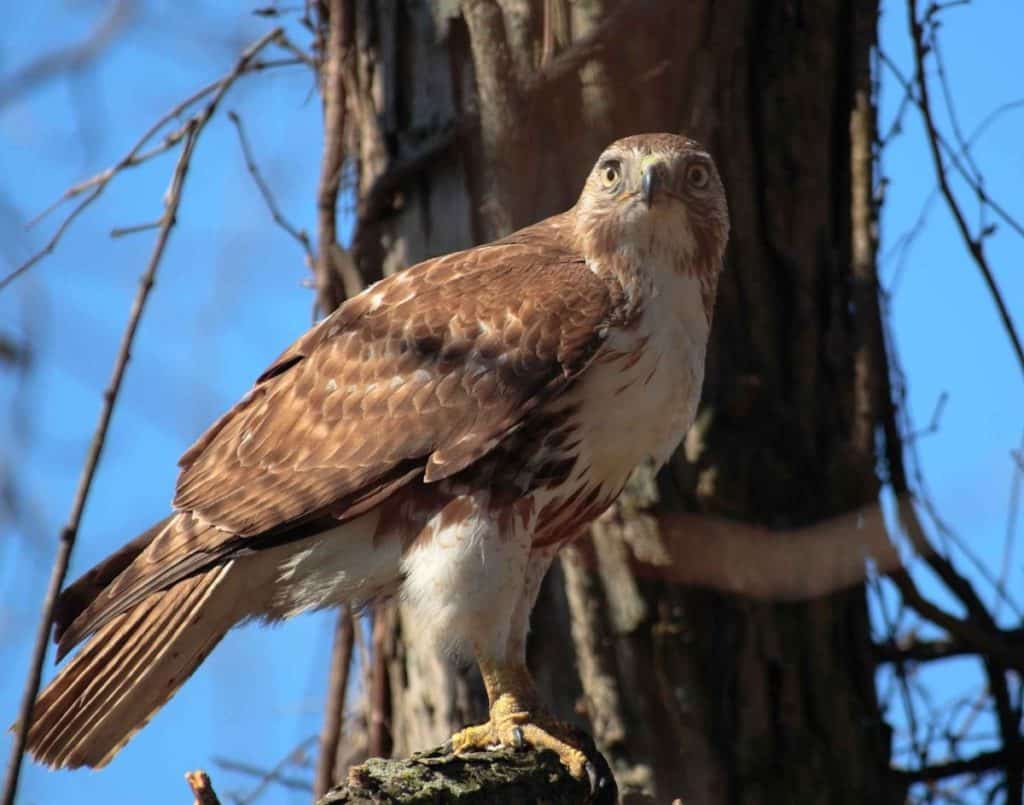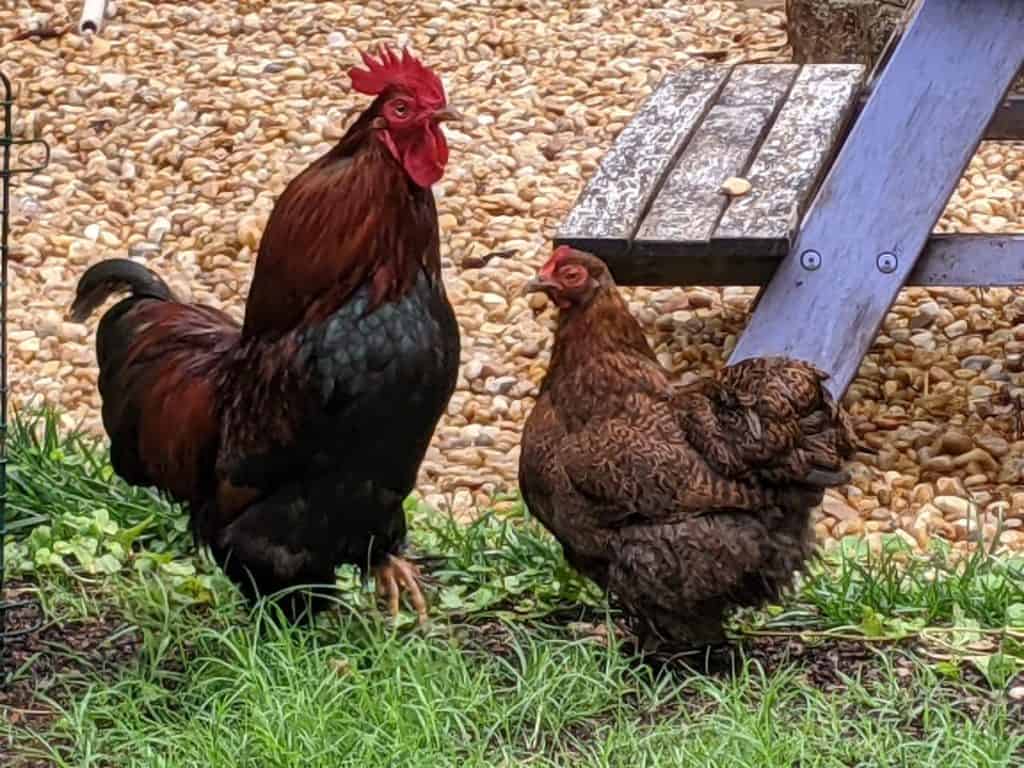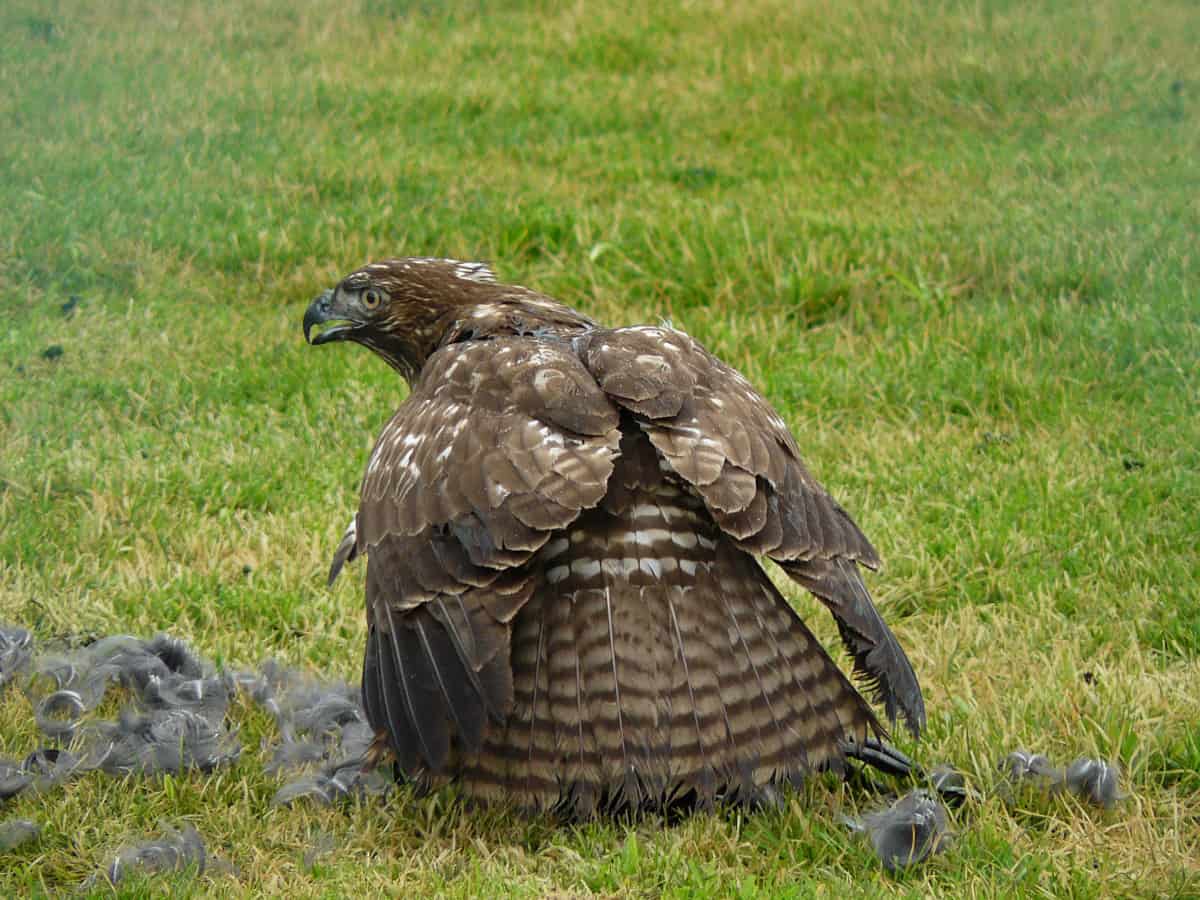Hawks are beautiful and majestic, but that doesn’t mean you want them around your chickens. I constantly worry about hawks getting my flock as I let my chickens free-range in my backyard during the day. Predators are a threat to all chicken owners. Here’s how to deter them humanely.
Protect your chickens from predators by giving them lots of cover like trees and bushes to hide under if attacked, placing a scarecrow and an Owl decoy in your yard to scare hawks away, hanging reflective mirror objects like old CDs around the yard to scare aerial predators away, and securing you coop at night.
If you are wondering how to keep hawks and other predators away from your chickens, read on.
How do you protect chickens from predators? 10 Ways Explained
All chicken keepers constantly worry about predators preying on their chickens. They worry about opossums, raccoons climbing the fences to get to the chickens, squirrels and snakes stealing eggs, coyotes, and foxes carrying off the hens.
Here are just a few examples of how you can protect your flock from predators and hawks.
1. Provide cover for your chickens
Give your chickens ample cover in the yard like fruit trees, bushes, and shrubs to hide under if a predator approach. If your chickens are kept in a supervised free-range run or area, provide cover by covering your run with a net or chicken wire to stop hawks from attacking your chickens from above.
By providing overhead protection, you ensure you are keeping hawks from snatching any of your chickens.
2. A Roof and Cover for Chickens
If your outside run is small, it is good to have a roof that keeps rain out and snow off the ground. Chickens and rabbits are prey species, and they recognize that danger can come from the sky. They are all safer when the run has an overhead cover.
3. Place an Owl decoy in the yard.
Eagles and Owls hunt hawks, and by placing an Owl decoy in your yard, the hawk will think twice before swooping in down low. A Life-size, realistic-looking owl decoy that makes movements are very effective at scaring away hawks.
4. Hide the feeders.
To stop hawks attacking your chickens while they are eating at the feeder, hide the chicken feeders away from the open areas. Place your feeders inside the coop where it is safe for them to eat.
Hawks will often target the chickens while huddled together, pecking away focused on the food, unaware of their surroundings.
5. Use noise deterrents.
You can use a noise hawk deterrent to scare away the birds. Animal activists prefer this option as it has no environmental impact. Another convenient way to scare hawks away is to get an ultrasonic bird repeller.
The ultrasonic bird repeller has customizable settings for volume, sensitivity, and frequency. If the sound is too loud or irritating for you, adjust the volume accordingly.
6. Remove hawk vantage points.
Hawks like to stake out their prey from a high vantage point, waiting for the right moment when the chickens are out in the open before they swoop in to attack. Hawks need a convenient tree or branch to perch on to check out the area.
A simple way to deter hawks is to remove these vantage points. Hawks like a view when they stalk their prey, so keep an eye out for tall trees, dead branches with no leaf cover, and utility posts that give the hawks a clear view. When you hear hawks screeching above, look out for where they perch.
7. Secure the coop from night-time predators
Be on the lookout for signs of predators digging tunnels under the coop. A concrete coop floor will help prevent this type of entry by predators.
If you don’t have a concrete floor, a wire mesh placed on a dirt floor beneath and tacked to the coop’s sidewalls can also work. Take care to fill in any cracks or holes in the walls and around doors with concrete, caulking, wire, or expanding foam to secure the coop.
8. Keep the area clean
Piles of debris, firewood, brush piles, and empty sheds all offer predators a safe hiding place as they approach. The fewer hiding places the predators have, the less likely they are to invade.
9. Make a scarecrow.
Through ancient times scarecrows have been used to protect crops. It seems that our ancestors also had trouble with pesky birds. Most birds, regardless of insect-eating, seed-eating or animal-eating, do not like the company of humans. Having a humanoid figure like a scarecrow standing guard in your chicken yard achieves the same effect.
10. Light Reflection
The easiest and cheapest way to deter hawks involves the use of reflective surfaces. Make your own yard reflectors using household items like old CDS, aluminum foil, or tiny mirrors.
You can use a string to hang them across your yard. These objects catch the light, produce bright light flashes that effectively scare hawks away.

What animals will kill chickens?
Predators are a threat, and they are everywhere. No flock is one hundred percent completely safe from any predatory species that would like to eat them.
Humans are not the only ones who like to eat chickens. Coyotes, foxes, dogs, raccoons, owls, mink, opossums, and hawks all kill chickens. Dogs are also one of the significant daytime chicken killers.
Cover all the windows in the chicken coop with sturdy wire mesh. Raccoons can easily tear through hexagonal chicken wire, so a stronger wire is needed to keep them out. One and a half-inch square hardware cloth stop raccoons and will even keep minks out of your coop.
What animals eat chickens at night?
Most chicken deaths occur at night when raccoons, opossums, skunks, owls, weasels, and mink, are most likely to prowl and kill chickens.
The best way to stop night-time killings is to safely lock your chickens up at night in a sturdy tight coop. When you bring your chickens inside at dusk, make sure the coop is secure. Chickens are almost comatose when sleeping. Once predators get inside the coop, they can easily pluck a hen off the roost.
The solution to night-time predators is to make their entry into the chicken coop impossible. A mink can squeeze through a one-inch diameter hole, while weasels can get in through even smaller cracks.
Other predators like Raccoons and domestic dogs generally kill more chickens than any other predator, and they both live in rural and urban areas.
Having a safe, secure coop for your chickens to sleep in at night should keep most night-time predators at bay.

Will a rooster protect chickens from predators?
By bringing in a rooster into your yard, your chickens will have a natural protector. Roosters’ instinct is to protect their hens. A rooster will call out and warn your chickens when a predator approaches, giving them time to run and hide under the brush or tree.
A rooster will also try to protect your flock and stand in between the hawk and your chickens. Roosters are larger than hens and have the size to fight and built-in weapons to take on hawks. Roosters also serve as lookouts and will sound the alarm every time any predators approach, giving the hens time to run for cover.
Roosters have sharp spurs and beaks and an instinct to protect their hens, making them an excellent hawk deterrent for chickens.
Will lights keep predators away from chickens?
It is a good idea to install a sensor-activated light that turns on at night as a hungry raccoon or any other night-time predator decides to approach.
A motion-sensor-activated light will light up the chicken run with light after dark. You can also install a set of Nite Guard Solar lights. Having a sensor-activated light in the yard near the coop will keep most nocturnal predators away.
Hawks are protected
As much a nuisance as hawks is to chicken keepers, it is essential to remember that hawks are protected by federal law. The Migratory Bird Act prohibits anyone, even a chicken owner whose flock has been taken out by these birds, from injuring or killing hawks or causing them any harm.
If you have exhausted all the measures suggested here without any positive results, contact your local U.S. Fish and Wildlife Service office or your state’s agriculture department to help resolve your hawk problem.
Conclusion.
Predators are clever and often catch chickens when owners least expect it. Months can pass by with no loss, and then many chickens can be killed in just one night. Preventing hawks and other predators from getting access to your chickens is the best way to keep them safe.
Hawks predominantly hunt during daylight hours. There are more than fifteen species of hawk in North America. Chicken keepers are sure to have at least one hawk as a neighbor at any time. Ensure your chickens don’t become fast food for these drop-in predators by following the suggestions listed above to protect your flock from hawks.

